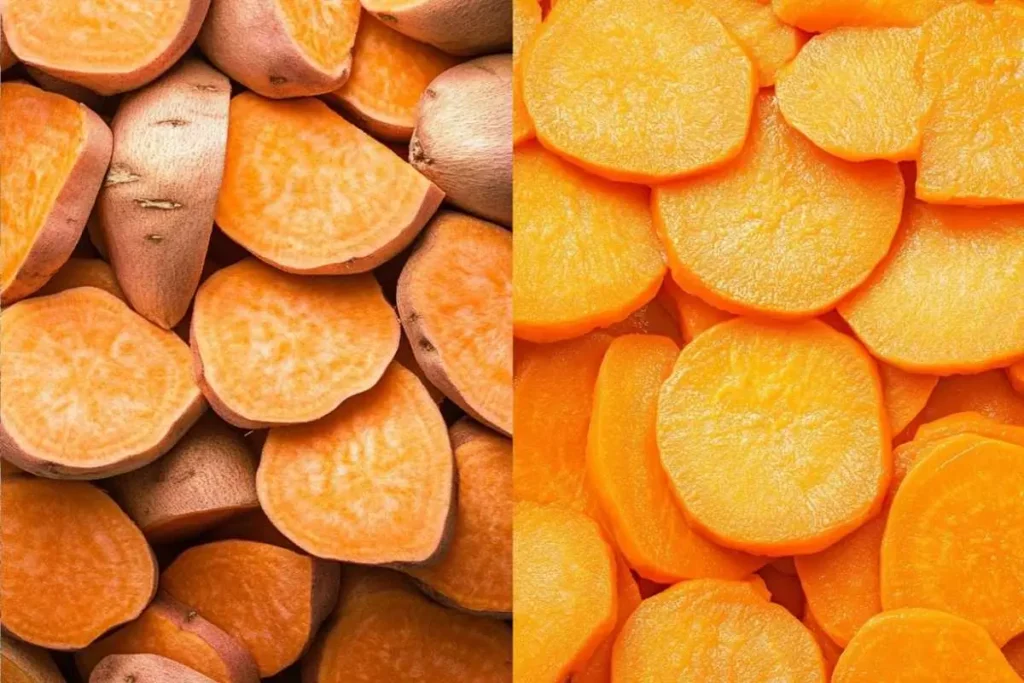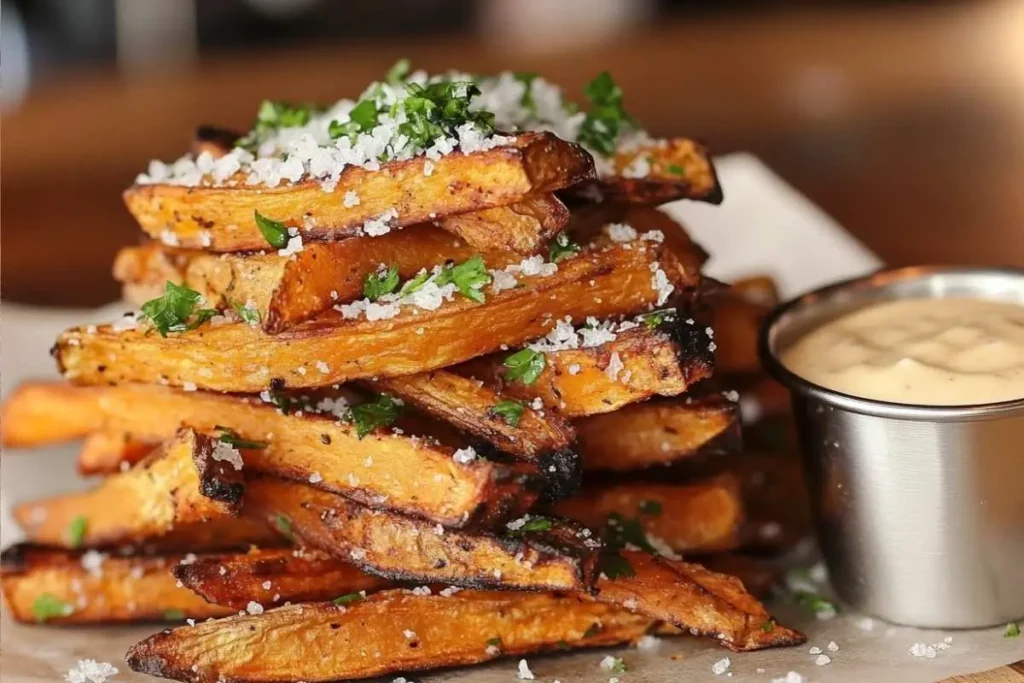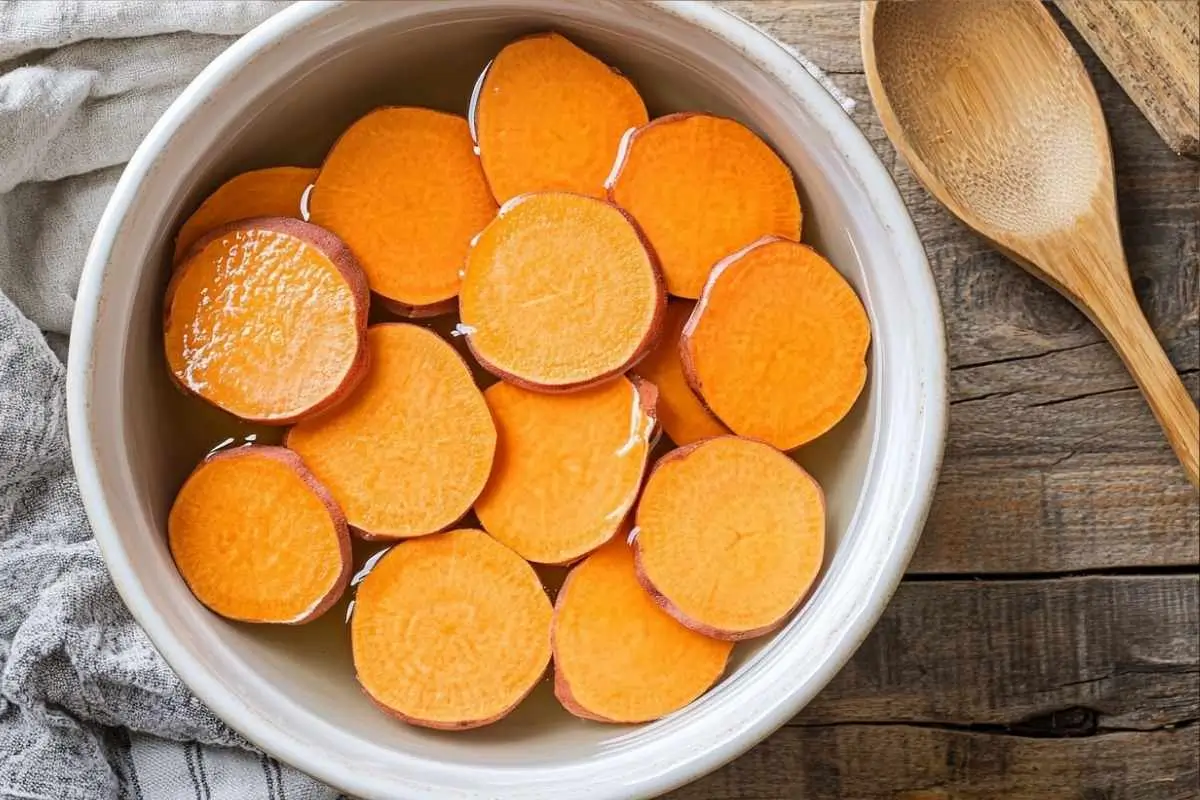Introduction
Why do you soak sweet potatoes before baking?” This is a common question among home cooks who want to achieve the best texture and flavor in their dishes. Soaking sweet potatoes before baking is a simple yet powerful technique that enhances natural sweetness, improves texture, and ensures even cooking. Whether you’re making crispy sweet potato fries or soft roasted wedges, this extra step can make all the difference.
In this guide, we’ll dive into the science behind soaking, the benefits it offers, and the best methods to get perfect results. Plus, we’ll clear up common myths and answer frequently asked questions to help you master the art of cooking sweet potatoes.
The Science Behind Soaking Sweet Potatoes
Why Soaking Sweet Potatoes Helps
Soaking sweet potatoes before baking serves a very specific purpose: removing excess starch. Sweet potatoes are rich in starch, which can prevent them from crisping up properly. When you soak them, the water breaks down some of the starch, creating a crispier and more golden-brown exterior once baked.
Additionally, soaking promotes even cooking. The water hydrates the surface of the sweet potatoes, preventing them from drying out in the oven. This process also enhances the natural caramelization of sugars during baking, giving your sweet potatoes that irresistible golden hue.
Another surprising benefit? Soaking reduces the chance of uneven texture. Without it, your sweet potatoes may end up with some sections that are mushy and others that are undercooked.
What Happens If You Skip Soaking?
If you don’t soak your sweet potatoes, you might notice some challenges:
- Uneven Cooking: The exterior may bake too quickly, leaving the inside undercooked.
- Less Crispiness: Excess starch prevents a proper crust from forming, especially for roasted wedges or fries.
- Inconsistent Sweetness: Soaking sweet potatoes can enhance their natural sugars. Without it, you miss out on that rich, caramelized flavor.
That said, skipping soaking is fine for certain recipes, like mashed sweet potatoes or sweet potato casseroles, where crispness isn’t the goal.
Soaking is a simple step, but it offers a host of benefits that elevate your baking results. Whether you’re aiming for crispy fries or soft, flavorful wedges, soaking sweet potatoes is worth the effort.
The Benefits of Soaking Sweet Potatoes
Soaking sweet potatoes before baking isn’t just a simple step—it’s a transformative process. This part delves into why this practice can elevate your dish and how it impacts texture, flavor, and nutritional value.

Unlocking Natural Sweetness
One of the standout benefits of soaking sweet potatoes is the way it enhances their natural sweetness. When you soak them, the starch begins to break down slightly, which helps release their inherent sugars.
💡 Pro Tip: Want a deeper caramelization when baking? Soak your sweet potatoes for about 30 minutes in cold water to unlock this effect.
Enhancing Texture and Moisture Balance
Soaking also improves the texture of baked sweet potatoes. It helps draw out excess starch, which can lead to a more evenly cooked, tender interior. If you’ve ever baked a sweet potato and noticed a slightly chalky texture, soaking could solve that issue.
For more tips on perfecting texture and flavor, check out our guide on How to Get Crispy Skin on Smoked Chicken. While it’s about chicken, the moisture-balancing techniques are applicable to many ingredients.
The Science of Soaking
To truly appreciate the benefits of soaking sweet potatoes, it helps to understand the science behind it. This section breaks down how water interacts with the starch and why it’s beneficial for baking.
Reducing Starch Content
Starch is naturally present in sweet potatoes, and while it’s not harmful, excess starch can prevent even cooking. When you soak sweet potatoes, the water helps dissolve some of this starch, ensuring a smoother, creamier texture when baked.
💡 Did You Know? This is why soaking is also a common practice with regular potatoes, especially when preparing fries or wedges.
Improving Flavor Absorption
Another perk of soaking is how it allows sweet potatoes to absorb subtle flavors. Adding a pinch of salt or a splash of lemon juice to the soaking water can infuse them with a delicate taste that complements their natural sweetness.
For an idea on incorporating rich and balanced flavors, explore our recipe for Philly Cheesesteak Tortellini, which shows how to balance bold ingredients effectively.
By understanding the science, you can see how soaking sweet potatoes isn’t just a culinary tradition—it’s a game-changing technique. Whether you’re preparing tarts or savory dishes, this step ensures a better, tastier result.
How Long Should You Soak Sweet Potatoes Before Baking?
Now that we’ve covered why soaking is beneficial, the next question is: how long should you soak sweet potatoes before baking? The answer depends on the results you’re aiming for, whether it’s enhanced texture, deeper caramelization, or faster cooking.
Short Soak (15-30 Minutes) – Quick Improvement
If you’re short on time but still want to see some benefits, a quick soak of 15 to 30 minutes in cold water will help remove some surface starch. This method works well when you’re roasting or baking whole sweet potatoes but don’t want to wait long.
💡 Pro Tip: If you’re making sweet potato fries, even a short soak will help them crisp up better when baked.
Extended Soak (1-2 Hours) – Best for Even Cooking
For optimal results, soaking sweet potatoes for 1 to 2 hours allows more starch to break down, leading to a smoother texture when baked. This method is perfect for mashed sweet potatoes or recipes that require a soft, creamy consistency.
Overnight Soak – When Should You Do It?
Soaking sweet potatoes overnight isn’t always necessary, but in some cases, it can be useful. If you’re prepping in advance or want an extra-soft, easy-to-mash texture, an overnight soak (8-12 hours) in cold water can work wonders. However, be sure to refrigerate them while soaking to prevent fermentation.
Looking for a way to use mashed sweet potatoes? Try our Old Fashioned Sweet Potato Tarts, where a perfectly smooth filling makes all the difference.
What Happens If You Don’t Soak Sweet Potatoes?
While soaking sweet potatoes before baking has its advantages, skipping this step isn’t necessarily a disaster. However, understanding the trade-offs can help you decide when soaking is worth it.

Potential Issues When Skipping the Soak
✔ Less Even Cooking: Without soaking, sweet potatoes may bake unevenly, especially if sliced.
✔ Chalky or Dry Texture: Starch retention can lead to a drier, slightly chalky interior.
✔ Longer Baking Time: Removing starch helps sweet potatoes bake more quickly, so skipping the soak might mean extra minutes in the oven.
💡 Did You Know? If you don’t soak sweet potatoes, you can still achieve a great texture by roasting them whole at a higher temperature (around 425°F).
When It’s Okay to Skip the Soak
✔ For Whole Baked Sweet Potatoes: When baking sweet potatoes whole, soaking is less necessary since the skin traps moisture.
✔ For Mashes & Purees: If you’re planning to blend them into a dish like mashed sweet potatoes or sweet potato pie, you may not notice a huge difference in texture.
If you’re looking for other comforting dishes, check out our Papas Locas – Loaded Potatoes, a fun and satisfying take on baked potatoes with delicious toppings.
By understanding both the benefits and potential drawbacks of soaking, you can make an informed choice based on your recipe and cooking goals. Whether you soak them for a short time or skip it entirely, the key is choosing the best method for your dish.
Why Is My Sweet Potato Still Hard After Baking?
Even after soaking, some people find that their sweet potatoes remain firm or undercooked after baking. If you’ve ever pulled your sweet potatoes out of the oven only to find them too tough to mash, there are a few common culprits.
Common Reasons Sweet Potatoes Stay Hard
✔ Not Baking Long Enough: Unlike regular potatoes, sweet potatoes have a denser cell structure, meaning they take longer to soften.
✔ Oven Temperature Too Low: Baking at a low temperature (below 350°F) might not generate enough heat to break down the starches properly.
✔ Skipping the Pre-Soak: If you didn’t soak them, excess starch might have prevented proper moisture absorption, leading to dry, firm flesh.
✔ Using Cold Sweet Potatoes: If you take them straight from the fridge and into the oven, the sudden temperature change can slow down cooking.
💡 Pro Tip: Always allow your sweet potatoes to come to room temperature before baking for better consistency.
How to Fix Hard Sweet Potatoes
✔ Increase the Baking Temperature: Try baking at 400°F–425°F for a faster, more even cook.
✔ Wrap in Foil: This helps trap steam, keeping the sweet potatoes moist.
✔ Finish in the Microwave: If they’re still firm after baking, pop them in the microwave for 2-3 minutes to soften them quickly.
Is It Better to Soak Potatoes Before Baking?
Now that we’ve answered why do you soak sweet potatoes before baking, you might be wondering: should you soak all potatoes before baking? The answer depends on the type of potato and the recipe you’re making.
Regular Potatoes vs. Sweet Potatoes – What’s the Difference?
While both are starchy root vegetables, they behave very differently when soaked:
✔ Regular Potatoes: Have a higher starch content that benefits more from soaking, especially for fries or crispier textures.
✔ Sweet Potatoes: Lower in starch but higher in natural sugars, meaning they don’t always need soaking—unless you want to reduce moisture or improve crispiness.
When You Should Always Soak Potatoes
✔ For Crispy Baked Fries: Removing excess starch from regular or sweet potatoes enhances crunchiness.
✔ When Making Mashed Potatoes: Soaking regular potatoes prevents them from turning gummy after mashing.
💡 Did You Know? Soaking regular potatoes for 30 minutes to 1 hour removes surface starch, preventing them from sticking together during baking. However, extended soaking may cause some water-soluble nutrients to leach out. CNN explains how different cooking techniques, including soaking, impact the nutritional value of vegetables.
Looking for more comforting side dishes? Our Philly Cheesesteak Tortellini is a warm, cheesy meal perfect for cozy nights.
The Verdict: Should You Always Soak?
✔ If you’re making crispy fries or roasted cubes, yes—soaking helps.
✔ If baking whole sweet potatoes, soaking isn’t required but can help with even cooking.
✔ For mashed potatoes, regular potatoes benefit more from soaking than sweet potatoes.
By understanding when and why to soak, you can achieve the best texture and flavor for your favorite potato-based dishes!
FAQs
Many home cooks wonder: Why do you soak sweet potatoes before baking? Here are answers to some common questions.
What Happens If You Don’t Soak Potatoes?
Skipping the soak can affect texture and crispiness:
✔ Regular Potatoes: They may turn gummy or too starchy, especially for fries.
✔ Sweet Potatoes: Less starch means soaking isn’t essential, but it helps even out cooking and reduces surface sugars that cause burning.
💡 Pro Tip: Soaking cubed or sliced sweet potatoes in cold water makes them crispier when baked or roasted.
How Long Should You Soak Sweet Potatoes?
✔ For Crispier Texture (Fries or Cubes): 30 minutes to 1 hour in cold water removes excess starch.
✔ For Even Cooking (Whole Potatoes): A 10–15 minute warm water soak softens the skin.
✔ For Storage: Soak overnight in the fridge, changing the water to prevent sogginess.
Why Is My Sweet Potato Still Hard After Baking?
✔ Not Enough Time: Sweet potatoes take 45-50 minutes at 400°F–425°F to soften.
✔ Low Oven Temperature: Baking below 350°F won’t break down starches properly.
💡 Fix: If still firm, wrap in foil and bake 10-15 more minutes at 400°F.
Should You Soak Sweet Potatoes Before Baking?
When to Soak Sweet Potatoes
✔ For Crispier Texture: Cold water soaking removes surface starch and improves crispiness.
✔ To Prevent Burning: It reduces sugars, helping potatoes bake evenly.
✔ For Faster Cooking: Hydration promotes even heat distribution.
When You Can Skip Soaking
✔ Whole Sweet Potatoes: No need to soak—just prick the skin and bake properly.
✔ For Creamy Texture: If making mashed sweet potatoes, soaking isn’t necessary.
The Verdict
Soaking sweet potatoes isn’t mandatory, but it improves crispiness, prevents burning, and promotes even cooking. If you’re baking fries or cubes, a quick soak makes a noticeable difference. Incorporating nutritious vegetables like sweet potatoes into your meals is a great way to support overall health, as noted by Mayo Clinic, which highlights the benefits of whole, nutrient-dense foods in a balanced diet.
Next time you’re prepping sweet potatoes, try soaking them—it might just take your dish to the next level!

